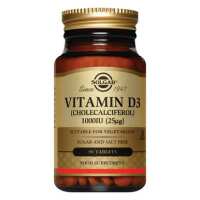
Solgar Vitamin D3 (Cholecalciferol) 1000 IU (25 mcg) provides the active form of vitamin D3, cholecalciferol, to help build and maintain strong bones and muscles. Vitamin D3 is also supportive to the immune system.Supporting optimal wellbeing, the benefits of the “sunshine vitamin” are numerous and well documented, but particularly for immune health. With over a billion people worldwide with very low levels of vitamin D, in addition to changing your diet and lifestyle, taking a vitamin D supplement is a good way to top up.Vitamin D is a fat-soluble vitamin that is required to promote calcium absorption, which helps to maintain healthy bones and teeth. Solgar's Vitamin D3 is a highly absorbable vitamin D. Obtained from the sunlight or vitamin D rich foods - over a billion people worldwide have very low levels of vitamin D. In addition to changing your diet and lifestyle, taking a vitamin D supplement is a good way to top up, especially in winter months.Vitamin D contributes to:Normal function of the immune systemMaintenance of normal bones and teethNormal absorption of calcium and phosphorusNormal blood calcium levelsMaintenance of normal muscle functionFREE from Gluten, Wheat, Dairy, Soy, Yeast, Preservatives, Sweeteners, Artificial Flavours or Artificial ColoursDirections: As a food supplement, take one Vitamin D3 1000iu tablet daily, preferably at mealtime, or as directed by a healthcare practitioner.If you are pregnant, nursing, taking any medications or have any medical condition, please consult your healthcare practitioner before taking this product.Each tablet provides. Vitamin D3 (1000 IU, as cholecalciferol) 25 µg. Bulking Agents: microcrystalline cellulose, maltodextrin. Anti-caking Agents: vegetable stearic acid, silicon dioxide, vegetable magnesium stearate. Glazing Agents: hydroxypropylmethyl cellulose, vegetable glycerin (from palm kernel oil and coconut oil). Cellulose Gum. Colour: riboflavin.What is vitamin D?Vitamin D is not strictly a vitamin. A vitamin is a compound that cannot be produced by the body and since vitamin D is produced in the skin, as a result of exposure to sunlight, it is more accurately described as a hormone. Although we are capable of producing vitamin D, we rarely make sufficient levels due to the latitude we live in and the fact that we constantly being told to wear sunscreens, which of course block sunlight.Why vitamin D is important?Vitamin D has recently make headlines due to the surge of studies and articles showing its multi-faceted role within our bodies and the widespread deficiencies that exist in the population. While it was once thought to only maintain healthy calcium and phosphorus levels required for bone production, recent studies indicate that vitamin D deficiency may be linked to a variety of chronic health concerns, including optimal immune function, diabetes, depression and even cell mutation. I am going to briefly explain vitamin D's benefits and its role for these concerns.How much vitamin D should we be taking?The recommended dosages of vitamin D, set many years ago at between 200iu and 400iu, were based on the amount of vitamin D in a teaspoon of cod liver oil, and still remain the basis in spite of all the publicity on vitamin D deficiency. We know from several studies that this dose is out by a factor of approximately 10 meaning that ideally we should be taking between 2000iu and 4000iu per day. A healthy and balanced diet can at the maximum supply us with 10 percent of the recommended daily amount and actually for the majority, our diets only supply us with 5 percent of the recommended daily amounts. This leaves a 95 percent deficiency of vitamin D in our bloodstream.What is the difference between vitamin D and vitamin D3?There are quite a few differences between vitamin D and vitamin D3, but the main difference between them is that vitamin D is a fat-soluble vitamin that regulates calcium and phosphorous levels in the body, whereas the vitamin D3 is the natural form of vitamin D produced by the body from sunlight.Should I take a vitamin D supplement?During the autumn and winter, you need to get vitamin D from your diet because the sun is not strong enough for the body to make vitamin D. But since it's difficult for people to get enough vitamin D from food alone, everyone (including pregnant and breastfeeding women) should consider taking a daily supplement containing 10 micrograms of vitamin D during the autumn and winter. Between late March/early April to the end of September, most people can make all the vitamin D they need through sunlight on their skin and from a balanced diet.Food supplements should not be used as a substitute for a varied diet. Store in a cool, dry place away from direct sunlight. Keep out of reach of young children. Do not exceed the daily dose. If pregnant, or breastfeeding, or if you are taking medication, or on medical care, consult your physician prior to use. While we work to ensure that product information on our website is correct, on occasion manufacturers may alter their ingredient lists. Actual product packaging and materials may contain more and/or different information than that shown on our website. All information about the products on our website is provided for information purposes only. We recommend that you do not solely rely on the information presented on our website. Please always read the labels, warnings, and directions provided with the product before using or consuming a product. In the event of any safety concerns or for any other information about a product please carefully read any instructions provided on the label or packaging and contact the manufacturer. Content on this site is not intended to substitute for advice given by medical practitioner, pharmacist, or other licensed health-care professional. Contact your health-care provider immediately if you suspect that you have a medical problem. Information and statements about products are not intended to be used to diagnose, treat, cure, or prevent any disease or health condition. The customer reviews are only moderated for offensive content – they should not be regarded as medical or health advice; no reliance should therefore be placed on them; and they are not endorsed by Victoria Health. If you have any health problems or questions regarding the suitability of any product please contact a health professional. Products are not medicinal unless otherwise stated. Victoria Health accepts no liability for inaccuracies or misstatements about products by manufacturers or other third parties. This does not affect your statutory rights.
About Victoria Health:
We are passionate about health and wellbeing and have long held a vision of radically changing the face of natural health.
We believe the products we recommend will make a positive difference to your health and wellbeing and we travel the world to source the most pioneering and cutting-edge supplements currently available.
With so much conflicting information about health products in the media, we will keep you up to date with the latest research and development in the field of complementary health.
We do not accept any form of advertising on our site and we will not list or recommend products unless we believe in them or use them ourselves.
Shabir is a qualified pharmacist specialising in natural health products with over forty years of experience and Gill was named as one of the top 1000 influential people in London in the Evening Standard Progress 1000 Awards in October 2019. Our strengths are our products, customer care profiles and our customers, who constantly support and inspire us.
We do not have outside investment and we have financed our own vision. Our philosophy is one of wisdom, education and evolvement for the enhancement of health, ageing and wellbeing.
We make a stand for truth, honesty and integrity in all that we are and all that we do.
Gill Sinclair & Shabir Daya MRPharmS
Phone:
020 8951 4144
Email:
customercare@victoriahealth.com
Location:
Victoria Health, Unit 5 Atlantic Business Centre, Stirling Way,
Victoria Health, Unit 5 Atlantic Business Centre, Stirling Way
Borehamwood
WD6 2FQ UK




